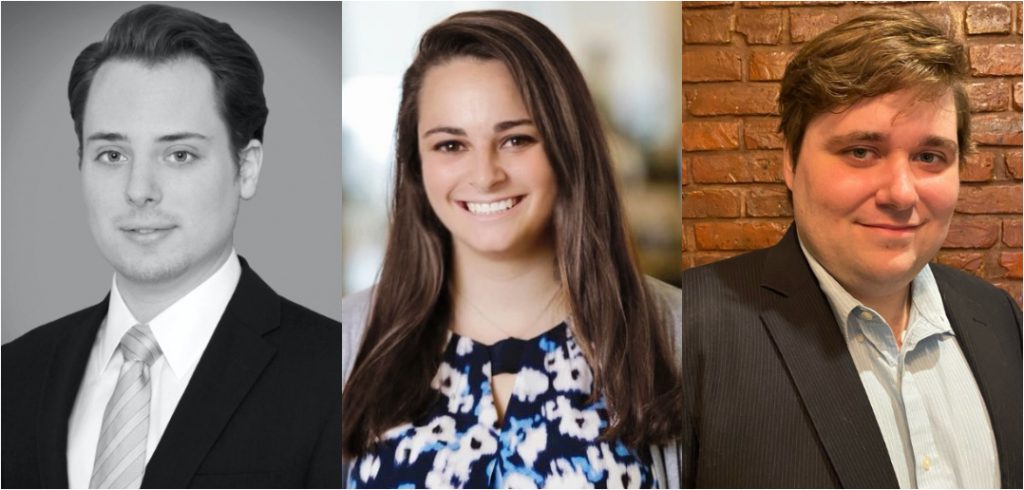Fordham Law swept two major art law writing competitions this year—the Phil Cowan–Judith Bresler Memorial Scholarship Writing Competition (sponsored by the New York State Bar Association’s [NYSBA] Entertainment, Arts, and Sports Law Section, and open to students in New York-area law schools) and the nationwide Lawyers’ Committee for Cultural Heritage Preservation’s (LCCHP) Law Student Writing Competition. Three Fordham Law students who took Adjunct Professor Leila Amineddoleh‘s art law seminar in 2019 and 2020 won cash prizes for their submissions.
“We’ve had a number of Fordham Law students awarded these prizes in the past, but I was happy that Fordham swept all the awards this year,” said Amineddoleh, who has been teaching the course for the past decade. “It’s truly a pleasure working with the wonderful students at Fordham, and it’s always a joy collaborating with them to produce high-quality work.”
Looting and the Law
Wade Speake ’22 won the LCCHP competition with a paper he wrote for Amineddoleh’s class in 2019. It primarily focused on customary international law and the looting of heirloom swords in Japan during World War II. However, the paper also theoretically explored if such a sword was sold in the United States now, could the original Japanese owners have any legal options to sue to get the sword returned.
“The topic Wade chose was related to material that we discussed in class, but he explored an area that I’ve never seen explored in a paper before,” Amineddoleh noted. “He applied his analysis to Japan, rather than what we often read about with looting by the Nazi Party. It was really interesting to hear a different perspective.”
Speake said his interest in Japanese history was piqued during class discussions about the looting of artifacts during wartime. “I’m really grateful we had this art law class and that Professor Amineddoleh taught it because it was something I really didn’t even think about as a field of law beforehand,” Speake said. “I really love doing this kind of research. The course was interesting and allowed me to dive into topics like this.”
Connoisseurship and Risk
Lawrence Keating ’21, president of the Fordham Art Law Society and a recent summer associate at Amineddoleh’s law firm, Amineddoleh & Associates LLC, was chosen as one of the NYSBA winners. Having previously worked at the auction house Christie’s, he was inspired to write about the issues currently faced by art authenticators and a market atmosphere that he says undermines consumer confidence.
In his paper, Keating argues that, as auction house prices continue to break records, the role of authenticators in the market has never been so critical. However, at the same time, he believes these experts have never faced as much scrutiny through a legal lens.
“Buyers with an art-as-asset-class mentality rely on connoisseurship in the place of due diligence to help understand and mitigate risk; however, connoisseurship’s academic roots and imprecise nature have caused growing pains for art investors,” Keating wrote. “Today, millions of dollars can hang in the balance of an attribution, and the fear of litigation over a negative attribution has caused many authenticators to cease offering their services.”
He suggests changes to the New York Arts and Cultural Affairs Law—with the goal of balancing additional protections for authenticators with incentives to educate consumers about the nature and reliability of art authentications. “The recommended approach seeks to more accurately reflect the imprecise, and occasionally indecent, nature of the art world, and the difficult reality that it is often the market, rather than the courts, that has the final say in artwork attribution,” Keating explained.
Keating also emphasized how Fordham Law students interested in art law have the upper-hand, given the school’s location in the center of the art market. “Being able to write this paper and hear the thoughts of someone who is respected in this practice and is at the forefront, is a really rare opportunity. I’m grateful to have had this chance and to Fordham for facilitating that.”
Reclaiming Art Stolen During the Holocaust
The other winner of the Phil Cowan–Judith Bresler Memorial Scholarship Writing Competition was Deanna Schreiber ’22, who took Amineddoleh’s class this past semester. She wrote an insightful paper that focused on the Foreign Sovereign Immunities Act in the context of Holocaust-era looted art.
“Individuals try cases about the art they lost during World War II and, under the act, most other countries are exempt from being subject to lawsuits in the United States. But, there are certain exceptions within the act that allow our judicial system to hear those cases,” Schreiber explained. “It was being heard in front of the Supreme Court during this session [on Dec. 7, 2020]and I wrote about the different outcomes that could happen in court and how that would affect remedies for people who are struggling to reclaim their art.”
Schreiber said she naturally gravitated towards this subject after learning about it in class and reading additional materials at her Professor’s suggestion. “I knew about Nazi recovery of art, but I didn’t know about this specific issue that was currently going on within the legal field,” she said. “The number varies by source, but over 100,000 pieces of art are still outstanding and haven’t been located.”
Schreiber added, “To see that other people read and valued what I wrote about and thought it was worthwhile was exciting and flattering.”

